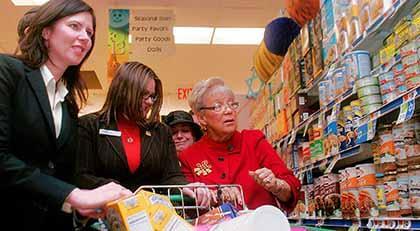By Joe Anuta
Passover is one of the most celebrated Jewish traditions, but the days surrounding the holiday highlight unique challenges for kosher food banks in Forest Hills and around the borough.
Food banks like the Queens Jewish Community Council, at 119-45 Union Tnpk., have seen demand for kosher food packages around Passover skyrocket in the past few years. It cannot even keep its shelves stocked.
“There is no comparison between the demand during Passover and the rest of the year,” said Warren Hecht, president of the council, several days before the holiday. “Last year we ran out. This year we will give out as much as we have.”
Hecht estimated that the council gave out about 3,000 packages before Passover, which began Tuesday and ends eight days later.
When Hecht arrived at the food bank in the mornings, typically there was already a line of residents hoping to get a Passover package, which includes unleavened bread, chicken, vegetables and soup mix, among other items.
“When it comes to Passover, they don’t have the money to buy the products,” he said.
That is because kosher products can be expensive and might break a budget that otherwise sustains a family throughout the rest of the year.
But that cost also means food banks like the council spend the same amount of money as another food bank but give out less food.
Roughly 22 percent of Jewish families in the city rely on food banks, according to Cynthia Zalisky, also from the community council, although that number might come as a shock to some.
“There is a stereotype out there that Jewish poverty is an oxymoron,” she said. “But every month it’s getting worse. This holiday is especially bad.”
Between senior citizens, the unemployed and recent immigrants, the Jewish community in Queens relies heavily on food banks, especially because of the lackluster economy, she said.
“[Middle-class families] are the ones who usually donate food to us,” she said. “But now they are the ones in line.”
And to further complicate the food bank’s efforts, both the city and federal government have cut funding to the council by a total of roughly 40 percent, according to Hecht.
To compensate for the drop in funding, Hecht had to lay off two employees and rely more heavily on volunteers to make ends meet.
The council has also been depending more on private donations to keep its shelves stocked.
For example, Shop ’n Save donated 1,000 pounds of kosher items to the food bank for Passover last Thursday.
Reach reporter Joe Anuta by e-mail at januta@cnglocal.com or by phone at 718-260-4566.



































